Director for Asia and Oceania French Ministry for Europe and Foreign Affairs, Thierry Mathou is both a career diplomat in the French diplomatic service and a scholar specialized in Asian studies. He started his diplomatic career in 1989 at the French Embassy in Washington DC. Specialized in Asian Affairs, he was assigned three times to China (Beijing and Shanghai) where he spent eleven years and held several positions including Consul general in Shanghai (2006-2010) during the 2010 World Expo.
He was appointed Director for Asia and Oceania at the French Ministry for Europe and Foreign Affairs in August 2017. Mathou’s scholarly focus is on China-India relations and Himalayan studies. He is also a notable specialist in Bhutan studies. He has been associated with the French National Centre for Scientific Research (CNRS) since 1989.
Mathou is Knight of the National Order of the Legion of Honour of the French Republic. Khabarhub’s Raghab Sharma has a candid conversation with Mathou in Kathmandu recently. Excerpts of the conversation:
As a milestone event in the 70th anniversary of the bilateral relationship between Nepal and France, an MoU for the establishment of the ‘first bilateral consultation mechanism’ is signed during your visit here. Could you please shed light on how it’s going to be functioning and what impact it can have in the future?
First of all, I would like to make it clear that my visit was organized in the context of the celebration of the 70th anniversary of the establishment and of the diplomatic relations between France and Nepal.
This year started with high-level political visits from both sides, and the most important and historic visit was by Nepal’s Prime Minister K. P. Oli to Paris in June.
I thought it was important in my role as Director-General in charge of Asia and Oceania in the Ministry for Europe and Foreign Affairs to come here to finalize the MoU which is to institutionalize political consultation between Nepal and France.
I would say that France and Nepal enjoy very good relations, we don’t have any issues, but at the same time, we need to put some flesh around bones and more content in our relations, especially in the economic sector.
This consultation process and mechanism will allow us, on the regular base, to exchange on all kinds of issues — political, multilateral and economic, assuming that we can engage in G2G activities.
Meanwhile, our intention on the French side is to lead the way for our businesses with the private sector, and the kind of exchange that I had with the Nepali side of the private sector was very interesting to try to, as I said, put more content in our relations.
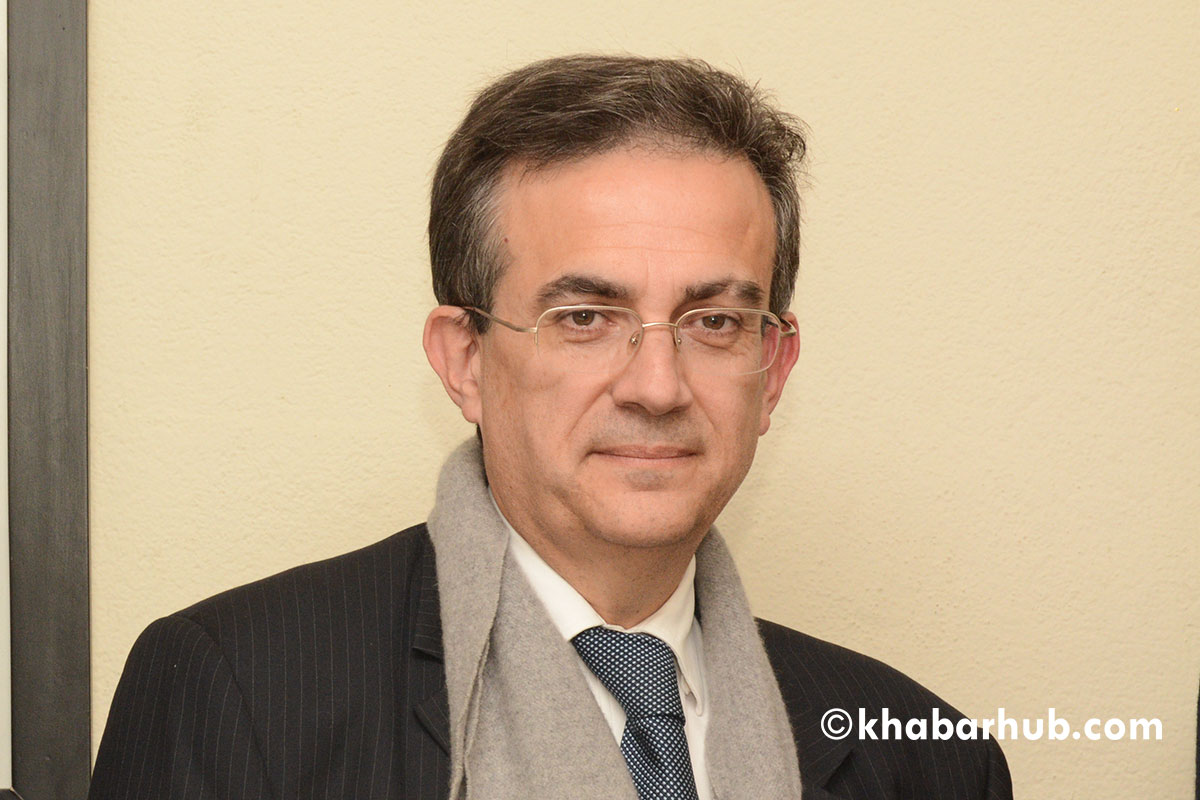
France is very eager to be more engaged in Nepal, we happen to have a very good relations with different stakeholders in the region, with China and with India; and I think that we have very good relation because we have a very ancient relation, historic relation for different regions, I think once again, we have to work towards more engagements, more involvement in Nepal, especially on economic grounds.
The Government of Nepal has tried to assure the conducive environment for Foreign Direct Investment (FDI) in Nepal. What areas is France planning to invest in Nepal?
In terms of trade and economic interactions, I think, there are, for instance, two important sectors where we can do more.
First is tourism, which is a top priority for Nepal, as a matter of fact, Nepal is organizing Visit Nepal 2020 and I think it’s a very good opportunity, not only to bring more French tourists to Nepal, which is quite easy, because we already have quite a lot visiting this country but also to bring businesses, to help Nepal upgrade its tourism industry; because, I think, for the future of your tourism industry, there’s not the only question of number but there is the question of quality.
I am sure, you know, that France is the 1st destination in the world in terms of tourism attraction. We have lots of expertise in services, in infrastructures, in hotel industries, even technology applied to the tourism sector, so this is one example.
Another example that is also very important for Nepal is the fight against climate change and the protection of the environment. Next year, the government of Nepal has decided to organize in April a very important conference the Sagarmatha Sambad.
I think this can be a very good opportunity for the fight against climate change. This has also been one of the top priorities for our president and our government.
We are exploring some opportunities to cooperate on the bilateral level, in the sector of water management, in the sector, as I said, of sustainable tourism, in the sector of forestry, in the sector of new energies, etc., even in the cable car.
As a matter of fact, among the specific projects, we are considering now in Nepal the cable car project in Kathmandu and maybe in other places in Nepal.
So, those are examples of what we can do in your country. Apart from this, I am sure you are also aware that, we are much involved in discussions with your government on a project like providing satellite to Nepal, or in the project to help your country to aid facilities to print official documents like passports, etc.
This shows a very wide range of sectors where France can be involved in not only the private sector but also the government. So we are very keen to finalize those deals I just mentioned because it could be a sign and also because it could pave the way for further future investment of France in Nepal.
As a career diplomat who spent considerable time in Asia, you have witnessed most of the major historical events of both Europe and Asia. What do you think Nepal’s role can be in finding its role in this multi-polar, world, as it’s going on now?
As you said, most of my career as a diplomat has been in Asia, I spent 15 years in China in different postings and I was an ambassador in Myanmar and ambassador in the Philippines. I am also very interested in Asia, especially in this part of the world, and in Nepal, as a scholar. I am a diplomat and scholar.
As a matter of fact, as a scholar, I specialized in Himalayan studies. So, my focus was to study and understand what’s happening in this part of the world in terms of geo-politics, so meaning my interest in the interaction of Nepal with India and China; how it works in Bhutan, etc. So, I have always been convinced that this part of the world, especially Nepal, because of your geopolitical and strategic geographical position between the two giants i.e. China and India is key, is very important.
And this is one of the reasons why France is interested in developing relations with Nepal. Also, what was very important to us is to notice democratic change and evolution which happened in Nepal.
Obviously, to some extent, you have been somehow inspired by our values: democracy, our motto as you know is liberty, equality, and fraternity. So this creates lots of bond between us. France is very attached to the preservation of multilateralism, and I think, it’s also the case with Nepal.
As I said there is a wide range of issues, where we share the same view, I think, that in South Asia, Nepal can be a contributor, for instance, in the perspective of Sagarmatha Dialogue.
You have the potential to become really a leader because as far as climate change is concerned, we always focus on island countries, but we after realized that Nepal as a mountainous country is raising concern about the climate change, after all, we are also the mountainous country; we have the French Alps.
In this way, there are many reasons, many issues we are happy to work with Nepal, share views. Your country has also been very active in the sector of peace-keeping, Nepali soldiers and other security forces have been supporting in peace-keeping in Africa and other parts of the world as a part of UN missions.
As most of them are involved in African countries, they also need to learn French; we provide some training for them. So, as I said, all those reasons provide good opportunities for us to interact at different levels: multilateral, bilateral, so, it’s a very good opportunity.
As a witness of ‘bipolar’, ‘unipolar’ to ‘multipolar’ world, don’t you think that democratic principles are sidelined in a way by ‘extremist’ or to use the softer term ‘nationalist’ forces now?
First of all, we have to work for the preservation and the promotion of multi-order, I mean nobody has nothing to gain in unilateralism, protectionism, and especially in Asia, nobody has nothing to gain on one power or in being monopolistic hegemony.
So, this is why, France is very eager to play the role in Asia, not on its own, but with Europe, to play the role of balance in power. I mean, we want the continuation of geopolitical balance in this region.
Second, you are right to say that there is a tendency with the development of terrorism, extremism to marginalize human rights and democracy. But I want to insist on the fact that those values, democracy, and human rights are not western values, they are also the Nepali values, and they are universal values.
Obviously, we all have our own perspective, our own culture in the way we can organize things in Nepal is not same as France; but basically, once again those core values, are universal; so we have to team up to fight against extremism or all kinds of extremisms coming from politics, from religion.
We have to team up to fight against terrorism. There is an important principle in France, and now, it’s also core value in Nepal, and it is a secularism i.e. separate the state from the religion. It’s not a part of your history because before it was different.
But now, it’s an important value, something we can discuss and share views. Once again we came from different historical and cultural backgrounds, but this interaction is very fruitful to preserve those universal values.
What about the rise of the so-called ‘nationalist’ governments in Asia and even in Europe and America? Citing the rise of the type of leaders in the power nations and the rising powers. Don’t you think the politics getting deviated or derailed from democracy?
I will not categorize any type of politics you described as nationalistic or whatever. It’s not up to me to make this kind of comment, I just want to say, as I already said is that we have to cooperate at international levels. So, obviously, each country has its own interests and some values. It’s normal to promote as some point national values. But, as I said, on the other hand, national values have to team up to support international values.
It’s a pleasure to know that your interest has been the Himalayan studies, and that has been your focus of research too. Coming to Nepal, what do you think are most fascinating about Nepal?
Everything. Everything is fascinating in this country. Firstly, you are the prime source of many forces — religious and cultural. I know, but sometimes it’s very complex to incorporate everybody in the mainstream.
But, diversity, is part of your wealth, another treasure. Second, your beautiful scenery, the bio-diversity. You may consider Nepal a small country, but I don’t like to call it small. I don’t think there are big countries and small countries; rather the countries facing big challenges.
One of the big challenges you had to face throughout history was to remain independent. And we have to remember, that Nepal was never colonized. Nepal has always been an independent country; so, this needs respect. And because, you have specificity in your DNA, despite being in this strategic geographical position, you have succeeded to remain independent.
We perfectly know that sometimes one has to face challenges, but it’s your honor to keep up with the vision; despite difficulties in some particular moments of history, its dignity, hospitality of the people, diversity in culture and language are something that always fascinates a visitor in Nepal. It’s a great country.
A bit personal now, would you please share with us how you got interested in the Himalayan region?
My interest in the region was aroused when I was very young reading books about the region, about first western scholars, adventurers visiting the Himalayas.
As a matter of fact, one of the first scholars, western scholars or to be specific European scholars visiting your country was the French, named Sylvain Levi.
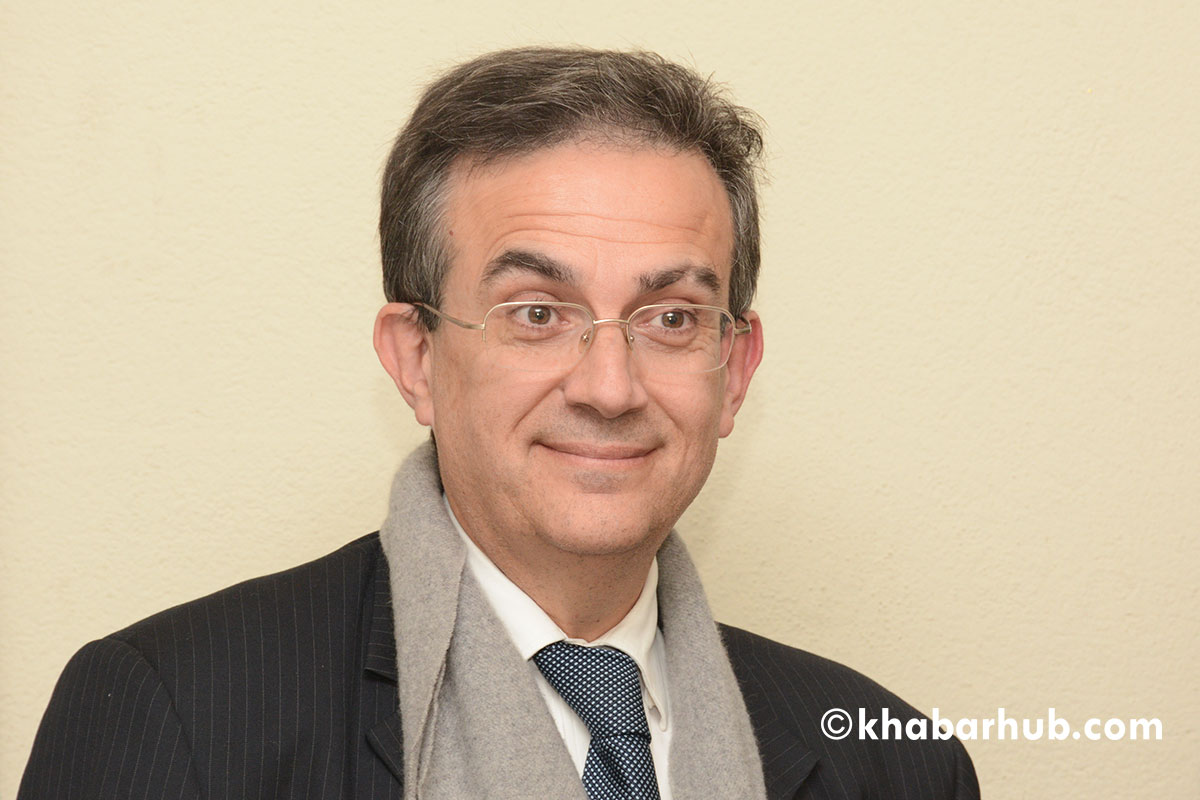
His first visit to Nepal was, if I am correct, in 1897 and a couple of years after he wrote a seminal book in two volumes first in 1905 and second in 1908 about the history of the ancient kingdom of Nepal. I read these books at a very early age, and it was fascinating for me, and as a matter of fact, these books have inspired since the beginning of the 20th century not only in France but in all Europe.
Generations of scholars were attracted to learn more about your country. So, it’s the way, I got acquainted with your country and to your culture and then I tried to learn some languages from the region and as I said I am a diplomat, but also a scholar, so it’s very important for me to try to get some insights as a scholar and from my other colleagues including here in this region, in this country to better understand as a diplomat.
In your opinion, where should Nepal keep itself in these Belt and Road Initiative (BRI) and Millennium Challenge Corporation (MCC) issues?
I think the way you did with your neighbors and big powers, you take the best from everyone. So far I know, you have always been in a no confrontation approach i.e. non-aligned approach. I think it’s the best solution for your country and it can be I mean inspiring.
Nepal is also influenced by French culture, we feel there must be some similarities, too. What do you think about the similarities in culture over there and culture over here? Can we draw some similarities between these cultures?
I was moved and very impressed when PM Oli visited France. He made a very inspiring speech in Paris in front of the Nepali community. He referred to some French writers he had the opportunity to read when he was in jail and afterward, the writers like Victor Hugo, who is key in our culture and universal writers.
But, let’s say that, our interaction does not end in history, I mean, I am very impressed by the contemporary cultural scene in Nepal, you have very productive new artists, painters. For instance, I visited an exhibition on Friday, where we see some creators inspired by the recent history during the war, the civil war I mean, in Nepal expressing the wish of some tribes or minorities.
So, there is lots of inspiration in your country. Once again the common point between our two cultures is that culture is important. Culture is key, so everything does not deal with the economy, with politics. Because culture is so important for you here and it’s important there too, there are a lot of opportunities for cultural sharing between the countries.
Eric Valli’s movie ‘Caravan’ had drawn many artists and nature lovers’ attention to Nepal. Can we explore the area of cooperation in the entertainment sector?
You have a very active movie industry. And I think we can consider some cooperation. Both bio-diversity and cultural diversity are the treasures that can be depicted in the movies.
Do you think there are some other things in common like love for good foods and others?
Oh, yes. I am fond of Nepali food. We have some Nepali restaurants in Paris. Love of art and culture and many other things related to humanity and fraternity are something that can make our bilateral and cultural bond firmer.
Our ambassador has also informed me that your hospitality and love for humanity, ability to cope with the hardship are unique.


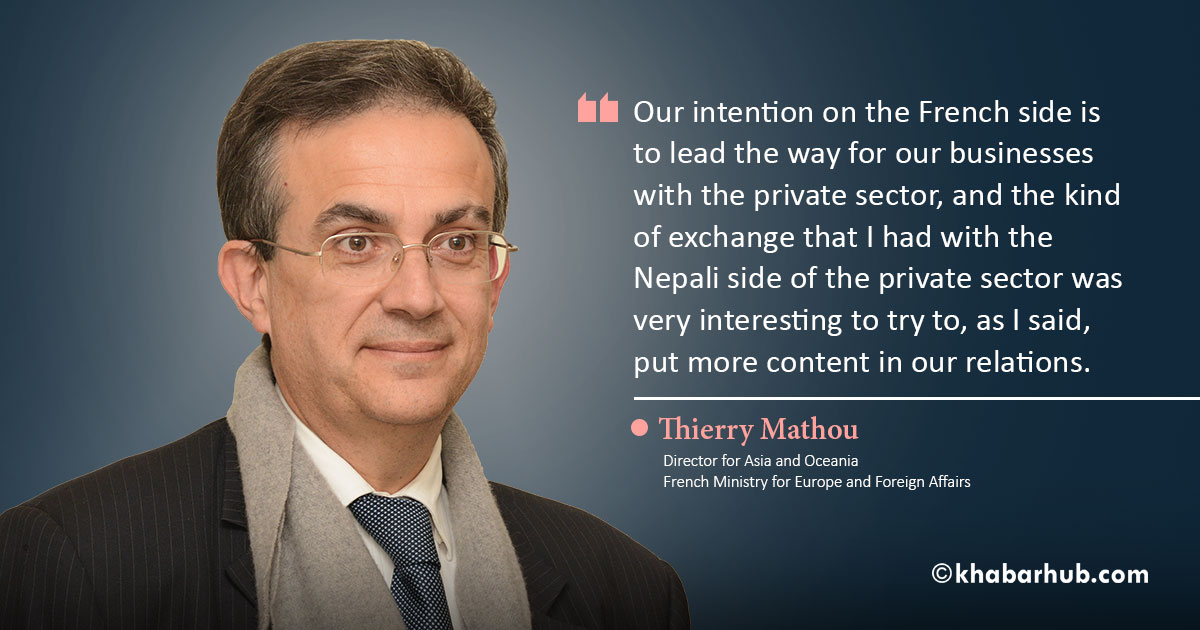



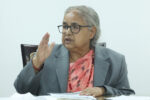
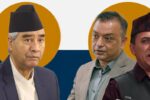

Comment